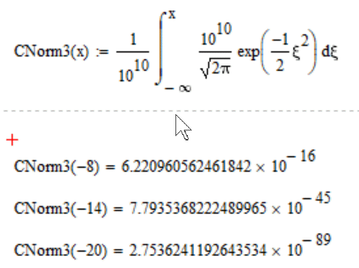Community Tip - Need to share some code when posting a question or reply? Make sure to use the "Insert code sample" menu option. Learn more! X
- Subscribe to RSS Feed
- Mark Topic as New
- Mark Topic as Read
- Float this Topic for Current User
- Bookmark
- Subscribe
- Mute
- Printer Friendly Page
How to evaluate cnorm(9)
- Mark as New
- Bookmark
- Subscribe
- Mute
- Subscribe to RSS Feed
- Permalink
- Notify Moderator
How to evaluate cnorm(9)
Hi everyone. I'm working with reliability and for many times I'm facing the problem that mathcad can't evaluate cnorm (x), when x is equal or bigger than 9; it returns 0. I read the comments related to the subject on https://community.ptc.com/t5/PTC-Mathcad-Questions/Standard-Normal-Dist/m-p/349437, but I couldn't solve the problem. It's not a problem that can be solved by going on format > results > tolerance (zero threshold) or tools > worksheet options > Built-in variables > convergence tolerance. I understand that mathcad can handle numbers up to 10^-307, but when solving an integral or, for example, applying cnorm function, the result is 0, when the number is less than 10^-17. I would be so thankful if someone could help me to solve this problem.
Solved! Go to Solution.
- Labels:
-
Calculus_Derivatives
Accepted Solutions
- Mark as New
- Bookmark
- Subscribe
- Mute
- Subscribe to RSS Feed
- Permalink
- Notify Moderator
Addendum:
For pure numeric calculation you could use this kind of "scaling":
- Mark as New
- Bookmark
- Subscribe
- Mute
- Subscribe to RSS Feed
- Permalink
- Notify Moderator
Not sure about your question.
In Prime 3.0
In Mathcad 15
can you post something showing cnorm(10)= ??
- Mark as New
- Bookmark
- Subscribe
- Mute
- Subscribe to RSS Feed
- Permalink
- Notify Moderator
Hi FredKohlhepp. Actually, I made a mistake; I'm facing problems evaluating cnorm(-9). I'm so sorry for the mistake.
- Mark as New
- Bookmark
- Subscribe
- Mute
- Subscribe to RSS Feed
- Permalink
- Notify Moderator
cnorm(x) should produce values near to 1 for any value of x >4.
Are you suggesting it's results suddenly drop to 0 when x reaches 9?
Or are you mistaken, and instead mean that it produces an actual 0 when x reaches or -9 (minus 9 !) or below?
Note that cnorm(x) = (erf(x/sqrt(2))-1)/2. You may want to see if that helps...
Success!
Luc
- Mark as New
- Bookmark
- Subscribe
- Mute
- Subscribe to RSS Feed
- Permalink
- Notify Moderator
- Mark as New
- Bookmark
- Subscribe
- Mute
- Subscribe to RSS Feed
- Permalink
- Notify Moderator
Hi LucMeekes. Yes, you were right. I made a mistake. The problem happens when solving cnorm(-9). I tried your solution using erf() function. It returns the same value of cnorm, but the problem continues. I can't evaluate cnorm (x), when x<-9. This question is so important for me because I'm working with reliability applied to structures, and problems like this happens all the time.
I would like to point some possible solutions, but I don't know how to apply any of them.
The first one is: If the problem is related to the integral, I remember reading somewhere that they were scaling the function to be integrated before the integration, and undo the scaling after. If It's possible, I could write the function equivalent to cnorm(x) and solve the problem, but I don't know how to scale the funcion f(x)=dnorm(x,0,1) to be integrated from -∞ up to -9. The integration of the function on the limits mentioned is equivalent to the cnorm(-9).
The second is: I read in another place about wrinting function in C to be added to the mathcad library. I'm just thinking; if in the C programming language It's possible to define some variable that is able to handle numbers less than 10^-17, maybe It would be possible to solve the problem. Actually Idon't know if the problem is numbers less than 10^-17 or the limitation of the program related to working with numbers above 17 decimal places. But the goal is to define a variable in C language that is able to handle these numbers.
Thank you all for the help and the good discussion.
- Mark as New
- Bookmark
- Subscribe
- Mute
- Subscribe to RSS Feed
- Permalink
- Notify Moderator
Would symbolic evaluation be a solution for you?
Please keep in mind that the precision (number of significant digits) you specify after "float", does not only affect the display of the result but applies for the whole calculation!
- Mark as New
- Bookmark
- Subscribe
- Mute
- Subscribe to RSS Feed
- Permalink
- Notify Moderator
Addendum:
For pure numeric calculation you could use this kind of "scaling":









